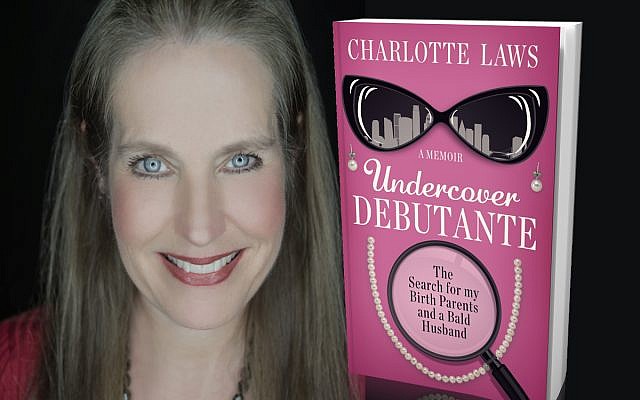In Search of a Birth Family
Charlotte Law's new book, "Undercover Debutante," is her second memoir, and her third book.
Atlanta native Charlotte Laws has two main messages she seeks to convey in her new book, “Undercover Debutante: The Search for my Birth Parents and a Bald Husband.”
“I think doing things for others is the key to happiness, and perseverance is the key to success,” Laws told the AJT from Los Angeles, where she now lives. “It’s not about focusing on petty things and being selfish.”
Her advice might strike a reader of her latest book as disingenuous since it’s a memoir of her non-conventional life as a celebrity party-crashing, sequin-clad adoptee obsessed with finding her birth parents. The 300-page book published by Stroud House and scheduled for release this week, is, well, a page-turner that reads like a soap opera. It strains the imagination, but Laws confirms that it’s her memoir. “It’s all accurate to my knowledge,” she jokes.
“Undercover Debutante” is actually her third book, and second memoir. Her first, published in 2015, was based on her first 21 years. Already, at 59, Laws has more escapades and exploits to share with her readers than most of us ever will. And fortunately, for her readers, she has a flair for relating them in colorful, captivating and conversational short chapters that keep her storytelling flowing.
Laws is unquestionably a maverick who refuses to conform from the start, especially to her adoptive, wealthy Atlanta family who reside in what she describes as a preppy, debutante society. As she writes, “Mom and Dad were racist, sexist and homophobic; and they claimed to be Christian, although they never attended church or discussed religion. They owned guns, raised cattle as a sideline investment, and had no interest in current events, charities or philosophy. They were, however, very interested in money. They were the embodiment of the saying, ‘Whoever dies with the most stuff wins.’”
Laws, on the other hand, became an animal rights activist, vegetarian and Reform Jew.
In her book, she quotes several academicians who point out the importance of nature over nurture. Laws herself obviously believes that genes determined who she became as a person rather than the adoptive family in which she grew up.
Again, she summarizes that “My birth mom had been raised Christian, then attended a Unitarian church for a year, and finally converted to Reform Judaism. I had been raised a Christian, then attended a Unitarian church for a month, and finally converted to Reform Judaism. The interesting part is that we did not know each other or know about each other. We had lived in different states with different families; we had led completely separate lives.”
Her affinity to Judaism started when she was a student at Lovett High School. “I had sympathies for Judaism even when I was young. People would ask if I was Jewish – even people I didn’t know,” she told the AJT. But it wasn’t until she escaped Atlanta and was living in Los Angeles and started attending Friday night services at Stephen Wise Temple, that she actually started studying about Judaism and eventually converted.
She acknowledges that she received a good education at Lovett. “It was a wonderful school. Many of the teachers felt like parents to me. I went to their houses and I’m very grateful for that.” But Laws stresses that she “didn’t feel I was in sync with Atlanta. I never fit in. I was stifled in my family.”
That’s why her story really unfolds and picks up speed after she moved, first to Las Vegas and then Los Angeles. Admittedly a rebel, Laws took jobs – such as a stripper and house-cleaner – and perfected the art of crashing parties at celebrities’ homes and awards events. She says her first boyfriend was pop idol Tom Jones.
In “Undercover Debutante,” she writes about her experiences with other celebrities such as Merv Griffin, Tony Bennett, Milton Berle, President Ronald Reagan and Julio Iglesias.
But it’s the story of finding and meeting her birth family that is the soul of this book. Although Laws never names her birth father or birth siblings, she draws sharp parallels between herself and her birth mother and birth grandmother, whom she does name. In contrast, she names her adoptive father and calls him the “antagonist” in her life. She assumes that he will never read her book, which is probably good since her description of him is anything but complimentary.
“But I have no anger toward anyone in the book,” Laws states. In fact, writing the book about her adoptive and birth families – not to mention the father of her only child, and that daughter — was apparently cathartic for her. Her story will leave readers with mouths gaping wide.




comments